

Epdf?r3_referer=wol&tracking_action=preview_click&show_checkout=1&purchase_referrer=onlinelibrary.wiley. Claves de la enseñanza por proyectos de Kilpatrick. Edutec. Revista Electrónica de Tecnología Educativa. El archivo PDF seleccionado se debe cargar aquí si su navegador tiene instalado un módulo de lectura de PDF (por ejemplo, una versión reciente de Adobe Acrobat Reader).
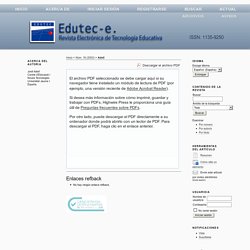
Si desea más información sobre cómo imprimir, guardar y trabajar con PDFs, Highwire Press le proporciona una guía útil de Preguntas frecuentes sobre PDFs. Por otro lado, puede descargar el PDF directamente a su ordenador donde podrá abrirlo con un lector de PDF. Para descargar el PDF, haga clic en el enlace anterior. Pantalla completa Pantalla completa desactivada Enlaces refback. WebQuest ¿Qué son? Definición Origen Tipos Definición.
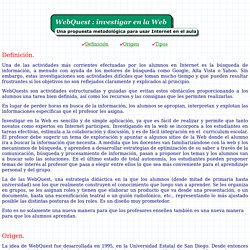
1980 BarrowsTamblyn PBL. 02e7e5304ae9d21cb8000000. Aula educativa Marta 2. El aprendizaje basado en problemas - Genoveva Sastre. Epdf?r3_referer=wol&tracking_action=preview_click&show_checkout=1&purchase_referrer=onlinelibrary.wiley. Essential Readings in Problem-based Learning. ERIC - The Essentials of Problem-Based Learning., Journal of Dental Education, 1998.
MOOC Aprendizaje Basado en Proyectos. ABP: una estrategia metodológica de éxito. Project-Based Learning Research Review. Editor's Note: This article was originally written by Vanessa Vega, with subsequent updates made by the Edutopia staff. Studies have proven that when implemented well, project-based learning (PBL) can increase retention of content and improve students' attitudes towards learning, among other benefits. Edutopia's PBL research review explores the vast body of research on the topic and helps make sense of the results. In this series of five articles, learn how researchers define project-based learning, review some of the possible learning outcomes, get our recommendations of evidence-based components for successful PBL, learn about best practices across disciplines, find tips for avoiding pitfalls when implementing PBL programs, and dig in to a comprehensive annotated bibliography with links to all the studies and reports cited in these pages.
What is Project-Based Learning? The Power of Project-Based Learning. Teacher Terry Thode tells her students she is only one resource of many available to them in their search for knowledge.
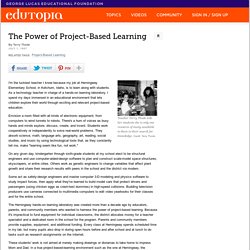
I'm the luckiest teacher I know because my job at Hemingway Elementary School, in Ketchum, Idaho, is to learn along with students. As a technology teacher in charge of a hands-on learning laboratory, I spend my days immersed in an educational environment that lets children explore their world through exciting and relevant project-based education. Envision a room filled with all kinds of electronic equipment, from computers to wind tunnels to robots.
There's a hum of voices as busy hands and minds explore, discuss, create, and invent. Students work cooperatively or independently to solve real-world problems. On any given day, kindergarten through sixth-grade students at my school elect to be structural engineers and use computer-aided-design software to plan and construct scale-model space structures, skyscrapers, or entire cities. Edutopia. Project-Based Learning: What Experts Say. Sylvia Chard, The Project ApproachVicki Davis, Flat Classroom ProjectChris Lehmann, Science Leadership AcademyJohn Mergendoller, Buck Institute for EducationSeymour Papert, MIT's Media LabBob Pearlman, Education ConsultantEeva Reeder, Education ConsultantOrganizations and Resources that Support and Promote PBL Sylvia Chard Sylvia Chard is a Professor Emeritus of Elementary Education at the University of Alberta and coauthor of Engaging Children's Minds: The Project Approach, a popular book for teachers of young children on learning through projects.
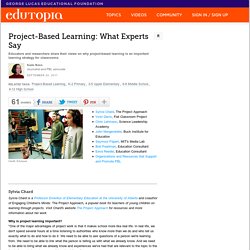
Visit Chard's website The Project Approach for resources and more information about her work. Why is project learning important? "One of the major advantages of project work is that it makes school more like real life. "You see this with a young class of learners who've not yet learned classroom behavior. Read the full Edutopia.org interview with Sylvia Chard. Back to Top Vicki Davis. Project Based Learning: Preparing Students for Tomorrow, Engaging Them Today (Spanish) – Buck Institute for Education Online Store.
New Publication!
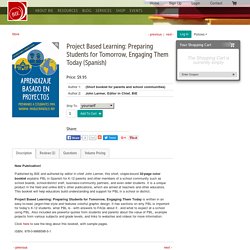
Published by BIE and authored by editor in chief John Larmer, this short, staple-bound 32-page color booklet explains PBL in Spanish for K-12 parents and other members of a school community such as school boards, school/district staff, business/community partners, and even older students. It is a unique product in the field and unlike BIE's other publications, which are aimed at teachers and other educators. This booklet will help educators build understanding and support for PBL in a school or district.
Project Based Learning: Explained. (SPANISH) Project Based Learning. The Benefits of Project Based Learning. Many parents and educators don't realize how large of an impact project based learning can have on the education of middle and high school students.
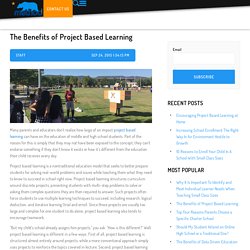
Part of the reason for this is simply that they may not have been exposed to the concept; they can't endorse something if they don't know it exists or how it's different from the education their child receives every day. Project based learning is a nontraditional education model that seeks to better prepare students for solving real-world problems and issues while teaching them what they need to know to succeed in school right now. Project based learning structures curriculum around discrete projects, presenting students with multi-step problems to solve or asking them complex questions they are then required to answer. Project Based Learning. Aprenentatge basat en problemes. PBL. MD4 2005ABP. A. SAENZ Treball ABP v. marc 2011 Albert Saenz. 64920 memoria. Aprenentatge basat en problemes. Aprenentatge per Indagació - Unitat de Suport a la Qualitat i la Innovació Docent ESUP/DTIC (UPF)
Les caixes de recerca - Escola dels Encants. Bon dia famílies!

Les caixes de recerca, són unes caixes que contenen una investigació amb varies preguntes d’un tema en concret per tal d’aprendre sobre diverses assignatures i aprendre a treballar en equip. Les investigacions contenen una mica de “tot”: propostes de Llengua, de Matemàtiques... Les caixes de recerca les construeixen les mestres segons el tema del seu ambient, o sigui, si la fa la mestra de biologia, la investigació en concret serà de biologia.
El treball de les caixes és col·laboratiu, l’infant les fa treballant en equip, tant amb els companys de la caixa, com amb les mestres. Primer, l’infant agafa la caixa amb 1 o 2 companys més, van a la mestra que porta la caixa i primer de tot, li confirmen qui la fa, desprès, normalment es comença a fer. Escola La Maquinista. Les nostres pràctiques es fonamenten en l’aposta per la confiança en la capacitat de cada nen i de cada nena per aprendre, afavorit per un ambient ric en estímuls.
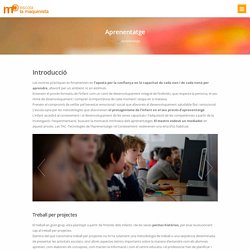
Entenem el procés formatiu de l’infant com un camí de desenvolupament integral de l’individu, que respecta la persona, el seu ritme de desenvolupament i compren la importància de cada moment i etapa en si mateixa. Prenem el compromís de vetllar pel benestar emocional i social que afavoreix el desenvolupament saludable físic i emocional. L’escola opta per les metodologies que afavoreixen el protagonisme de l’infant en el seu procés d’aprenentatge. L’infant accedirà al coneixement i al desenvolupament de les seves capacitats i l’adquisició de les competències a partir de la investigació i l’experimentació, buscant la motivació intrínseca dels aprenentatges. El mestre esdevé un mediador en aquest procés.